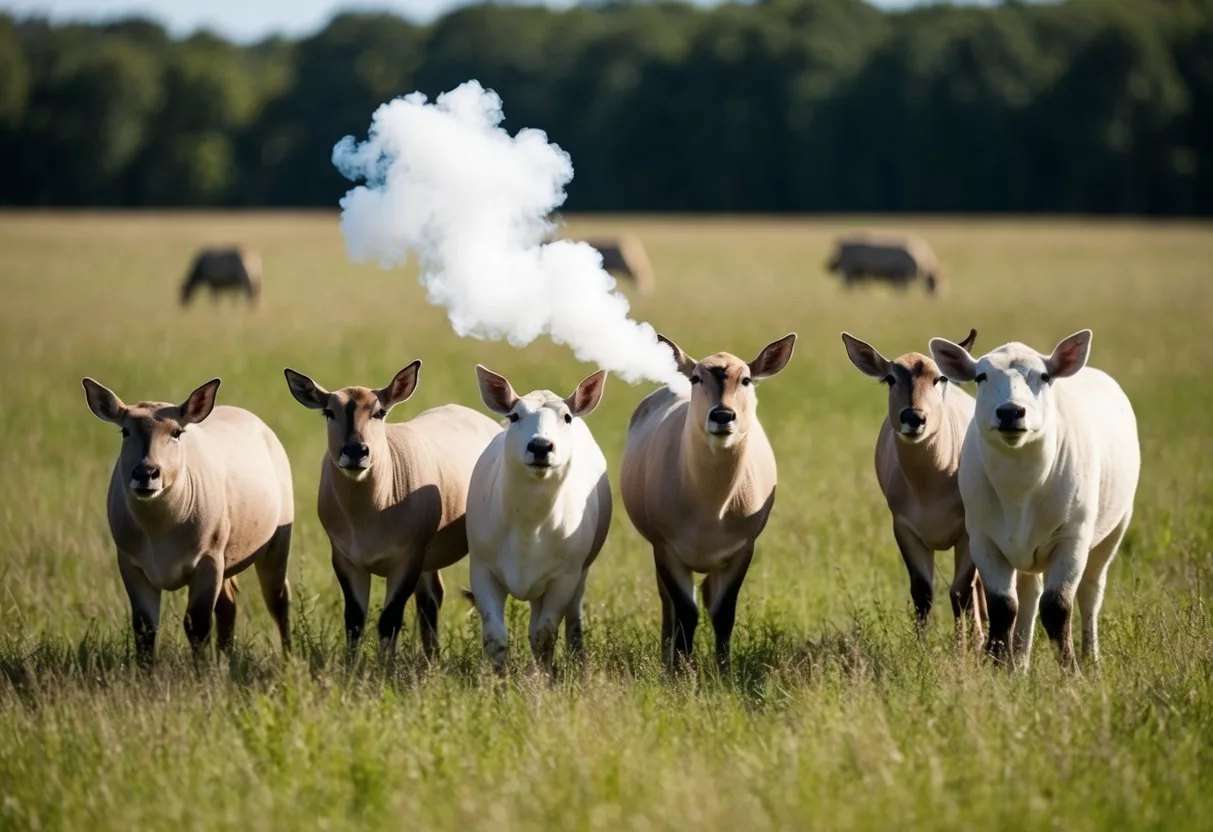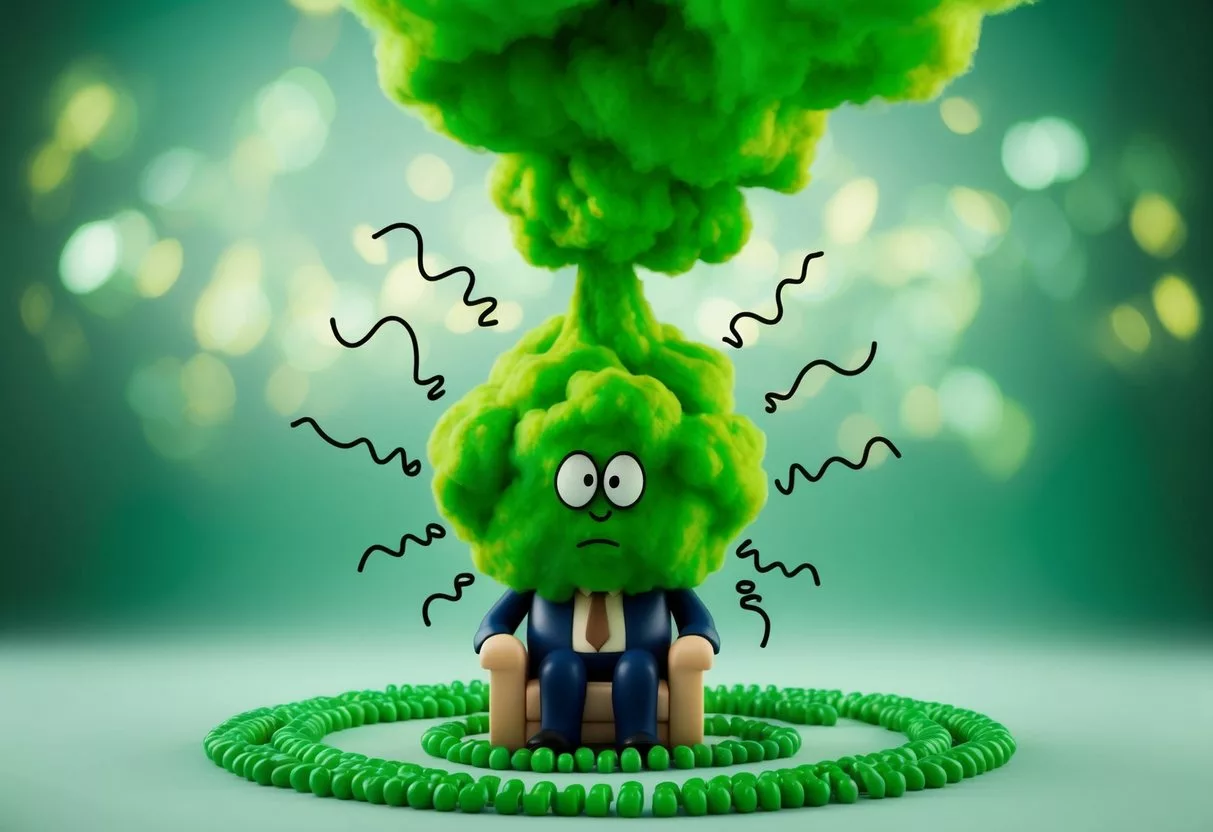Farts are a normal part of the human body’s digestive process. When we eat, our gut breaks down food and produces gas as a byproduct. This gas builds up in the intestines and is released through the rectum as a fart.

Farting can happen at any time, often without warning. The sound and smell of a fart vary based on factors like diet and gut bacteria. Some foods, like beans and dairy, can lead to more gas production and frequent flatulence.
While farting is usually harmless, it can sometimes cause social awkwardness in certain situations. The average person passes gas 5 to 15 times a day. Holding in farts for long periods can cause discomfort and bloating. It’s best to release gas naturally when possible to avoid these issues.
The Science of Farting

Farts are a normal part of the digestive process. They contain a mix of gases and are produced when food breaks down in the gut.
Composition of Flatulence
Farts are made up of several gases. The main ones are:
- Nitrogen (20-90%)
- Hydrogen (0-50%)
- Carbon dioxide (10-30%)
- Methane (0-10%)
- Oxygen (0-10%)
A small amount of hydrogen sulfide gives farts their smell. Most fart gases don’t smell. The exact mix changes based on what a person eats.
Foods high in sulfur, like eggs and meat, can make farts smellier. Beans and dairy can lead to more gas. Each person’s fart makeup is a bit different.
Digestive System and Gas Production
The digestive system makes gas as it breaks down food. This happens in a few ways:
- Swallowing air while eating or drinking
- Chemical reactions during digestion
- Bacteria breaking down food in the large intestine
Bacteria in the gut play a big role in gas production. They feed on undigested food and make gas as a result.
Some people make more gas than others. This can be due to diet, gut bacteria, or how their body works. Exercise and certain foods can help reduce gas.
Gas buildup leads to farting. It’s the body’s way of getting rid of extra gas. Most people fart 5-15 times a day, which is normal.
Common Causes of Farting

Farting is a normal bodily function caused by various factors. These include what we eat, how our digestive system works, and some of our daily habits.
Dietary Factors
Many foods can lead to extra gas in the gut. Carbohydrates and fiber are common culprits. Beans, broccoli, cabbage, and Brussels sprouts often cause gas. These foods contain sugars and fibers that are hard to digest.
Lactose intolerance can also cause farting. People with this condition can’t break down milk sugar well. This leads to gas when they eat dairy products.
Some people are sensitive to FODMAPs. These are types of carbs found in certain foods. They can cause bloating and gas in some people.
Digestive Conditions
Several digestive issues can lead to more farting. Constipation often causes extra gas to build up. This is because waste stays in the gut longer, giving bacteria more time to produce gas.
Celiac disease, where the body can’t handle gluten, can cause excess gas. Irritable bowel syndrome (IBS) is another condition that often leads to more farting.
Some medications may increase gas as a side effect. It’s important to talk to a doctor if farting becomes a big problem.
Ingested Air and Lifestyle Habits
Sometimes, people swallow too much air. This can happen when eating too fast or talking while eating. The extra air often comes out as a fart later.
Chewing gum and drinking carbonated beverages can also lead to swallowing air. This extra air needs to escape somehow, often as gas.
Smoking is another habit that can cause more farting. Smokers often swallow air when they inhale, leading to more gas in their system.
Physiological Effects of Flatulence

Flatulence causes several physical changes in the body. These include discomfort in the abdomen and movement of gas through the intestines.
Abdominal Discomfort and Bloating
When gas builds up in the digestive system, it can lead to abdominal pain and bloating. The stomach may feel full or tight. This happens because the intestines stretch to hold the extra gas.
Some people feel cramps or sharp pains. These pains can move around as gas travels through the gut. Bloating can make clothes feel tight and cause visible swelling of the belly.
Excessive gas can increase pressure in the intestines. This may trigger the urge to pass gas or have a bowel movement. In some cases, trapped gas can cause more severe pain that mimics other conditions.
Intestinal Gas Movement
Gas moves through the digestive tract in various ways. It can travel upwards, leading to belching. Or it can move downwards, resulting in flatulence.
The body usually gets rid of gas by passing it through the rectum. This process involves muscle contractions in the intestines. These push the gas along the digestive tract.
As gas moves, it can cause gurgling sounds known as borborygmi. These noises happen when gas mixes with liquid in the intestines. The speed of gas movement can affect how often a person passes gas.
Some gas gets absorbed into the bloodstream through the intestinal walls. The body then removes it through breathing.
Health Implications

Excessive gas and unusual farts can point to digestive issues or other medical problems. Paying attention to these signs may help catch health concerns early on.
Indicators of Digestive Health
Farts can reveal a lot about gut health. Normal farts happen 5-15 times a day and don’t smell too bad. Smelly farts may mean you ate foods high in sulfur. Very smelly or frequent farts could signal problems digesting certain foods.
Floating stools often go with gassy farts. This can mean your body isn’t absorbing fats well. Greasy stools are another sign of this issue.
Changes in fart smell, frequency, or discomfort may point to food intolerances. Common culprits include dairy, gluten, and artificial sweeteners. Keeping a food diary can help spot triggers.
Related Medical Conditions
Some health issues can cause changes in gas and farts. Celiac disease makes it hard to process gluten and often causes gas. Lactose intolerance leads to gas after eating dairy.
Irritable bowel syndrome (IBS) is linked to bloating and gas. Small intestinal bacterial overgrowth (SIBO) can cause excess gas too. Both may need a doctor’s help to manage.
Crohn’s disease and ulcerative colitis can change bowel habits and gas. Colon polyps or cancer may cause gas along with other symptoms. These need prompt medical care.
Unexplained weight loss with gas changes could mean a serious issue. See a doctor if you have ongoing gas with nausea, vomiting, or stomach pain.
Managing and Reducing Flatulence

Controlling excess gas is possible through diet changes, supplements, and medical advice. These approaches can help lessen discomfort and embarrassment.
Dietary Adjustments
Certain foods can increase gas production. Keeping a food journal helps identify problem foods. Common culprits include beans, dairy, and high-fiber vegetables.
The FODMAP diet limits fermentable carbs. This can reduce gas for some people. Slowly adding fiber to your diet may also help. Chewing food well and eating slowly can decrease air swallowing.
Foods to avoid if you’re prone to gas:
- Carbonated drinks
- Chewing gum
- Artificial sweeteners
- Fatty foods
Regular exercise can improve digestion and reduce gas buildup. Even a short walk after meals may help.
Over-the-Counter Solutions and Supplements
Several products can provide relief from excess gas:
- Beano: Contains enzymes that break down complex carbs
- Simethicone: Helps combine gas bubbles for easier passing
- Activated charcoal: May absorb gas in the digestive tract
Probiotics support gut health and can reduce gas in some people. Prebiotics feed beneficial gut bacteria and may help long-term.
For those with specific intolerances:
- Lactase enzymes for lactose intolerance
- Gluten-free diet for gluten sensitivity
- Fructose-free diet for fructose malabsorption
When to Consult a Healthcare Professional
See a doctor if gas causes severe pain or disrupts daily life. A gastroenterologist can test for underlying conditions.
Signs to seek medical help:
- Unexplained weight loss
- Blood in stool
- Persistent diarrhea or constipation
- Abdominal pain that doesn’t go away
Doctors may recommend tests to check for issues like celiac disease or irritable bowel syndrome. They might prescribe antibiotics if bacterial overgrowth is suspected.
Some cases may require prescription medications or dietary changes supervised by a healthcare provider.
Social and Cultural Aspects

Farting is a natural bodily function, but it has complex social and cultural implications. People’s views on flatulence vary widely across societies and situations.
Fart Etiquette and Public Perception
Breaking wind in public is often seen as rude or embarrassing in many cultures. Most people try to hold in gas when around others. If they must fart, they may try to do it quietly or blame the noise on something else.
In some settings, like among close friends, farting might be seen as funny. But in formal situations, it’s usually considered impolite. Cultural differences play a big role in how flatulence is viewed.
Some cultures are more open about bodily functions. Others see them as very private. This affects how people react to public farting.
Myths and Misconceptions
Many myths about flatulence exist. One common belief is that women don’t fart. This isn’t true – everyone passes gas. Another myth is that farts spread disease. While farts do contain some bacteria, they’re not a major health risk.
Some think holding in farts is dangerous. In reality, the gas will usually be absorbed or come out later. The idea that certain foods cause all gas is also false. Gas production varies from person to person.
Understanding these facts can help reduce stigma around a normal bodily function. It’s important to separate truth from fiction when it comes to flatulence.
Odor and Detection

Fart odors can range from unnoticeable to very unpleasant. The smell comes from gases produced during digestion. Some farts have little to no odor, while others can clear a room.
Factors Contributing to the Smell
The main culprit behind smelly farts is sulfur. Foods high in sulfur like eggs, meat, and broccoli can lead to stinkier gas. Bacteria in the gut break down food and release sulfur compounds.
Hydrogen sulfide gives farts their rotten egg smell. Other smelly gases include ammonia and methane. Diet plays a big role in fart odor. Eating lots of meat, dairy, and sulfur-rich veggies can make gas smellier.
Some medical conditions can also cause extra smelly farts. These include lactose intolerance, celiac disease, and irritable bowel syndrome.
Deodorizing Techniques
There are ways to reduce fart odors. Changing your diet can help. Eating less red meat and more complex carbs may decrease smelly gas. Drinking more water can also dilute smelly compounds.
Over-the-counter products like activated charcoal can absorb odors. Some people use special underwear with charcoal filters. These trap smells before they escape.
Good hygiene is important too. Regular bathing and clean clothes prevent odor buildup. Air fresheners and scented candles can mask smells in a pinch.
Scientific and Fun Facts

Farts are more than just funny noises. They play a key role in our bodies and offer some surprising insights into science and nature.
Role in the Microbiome
The gut microbiome is closely linked to farting. Trillions of bacteria live in our intestines, helping to break down food. As these microbes digest certain foods, they produce gases as a byproduct.
This process, called fermentation, creates the gas that makes up farts. Different foods can change the amount and smell of gas produced. For example, beans and cabbage often lead to more gas.
Scientists have found that farts can actually give clues about gut health. The types of gases in a fart can indicate which bacteria are most active in the gut.
Curiosities in Nature and Science
Farts aren’t just a human thing. Many animals fart too, from dogs to elephants. Interestingly, some animals use farts in unique ways. Herring fish, for instance, make bubble sounds with their rear ends to communicate.
In the world of science, farts have sparked some unusual research. One study looked at the flammability of farts. It found that about half of people produce flammable farts due to hydrogen and methane content.
Farts also play a role in space travel. In zero gravity, gas doesn’t rise as it does on Earth. This can cause discomfort for astronauts if not managed properly.